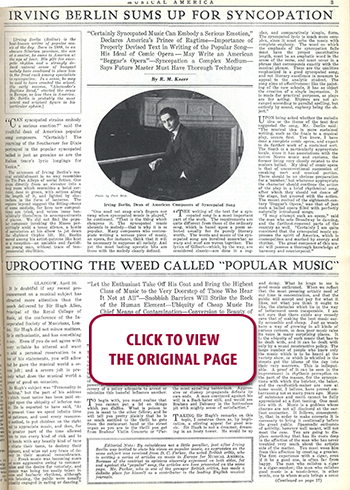 100 YEARS AGO IN MUSICAL AMERICA (393)
100 YEARS AGO IN MUSICAL AMERICA (393)
May 14, 1921
Page 8
IRVING BERLIN SUMS UP FOR SYNCOPATION
“Certainly Syncopated Music Can Embody a Serious Emotion,” Declares America’s Prince of Ragtime—Importance of Properly Devised Text in Writing of the Popular Song—His Ideal of Comic Opera—May Write an American “Beggar’s Opera”—Syncopation a Complex Medium—Says Future Master Must Have Thorough Technique
By R. M. Knerr
[Irving Berlin (Baline) is the best-known writer of popular music of the day. Born in 1888, in an obscure Siberian province, the son of a cantor, he came to America at the age of four. His gift for energetic rhythm and a strongly defined natural sense of buoyant melody have combined to place him in the front rank among specialists in syncopation. In a sense, he may be said to have created the school. His early success, “Alexander’s Ragtime Band,” started the craze in Europe, no less than in America. Mr. Berlin is probably the most potent and original figure in his particular sphere.]
“CAN syncopated strains embody a serious emotion?” said the youthful dean of American popular song composers. “Certainly! The yearning of the Southerner for Dixie portrayed in the popular syncopated ballad is just as genuine as are the Italian tenor’s lyric longings for Venice.”
The anteroom of Irving Berlin’s musical establishment in no way resembles the Tin-Pan Alleys of serial fiction. One steps directly from an elevator into a long room which resembles a hotel corridor, done in green, with settees along the length of it, and lighted by electroliers in the form of lanterns. The regions beyond suggest the fitting-rooms of some modiste, for here new compositions are tried, and voices issue tantalizingly therefrom to accompaniments of pianos. We did not find the popular composer invoking the Muses perspiringly amid a tense silence, a horde of secretaries at his elbow to jot down the slightest Orphic lilt. Mr. Berlin moved among his artist-patrons like host at a reception—an amiable and fastidious young man, without trace of temperamental ebullition
“One need not snap one’s fingers nor sway when syncopated music is played,” he continued. “That is the thing which cheapens it. The syncopated music abounds in melody—that is why it is so popular. Many composers who contemplate writing a serious piece of music, an opera, for instance, think that it will be necessary to suppress all melody. And yet the most lasting operatic hits are those with the melody clearly defined.
“THE writing of the text for a syncopated song is a most important part of the work. The requirements are quite different from those of the ordinary song, which is based upon a poem selected usually for its purely literary worth. The words and music of the syncopated song are involved somewhat as warp and woof are woven together. The lyrics of Gilbert—which, by the way, are considered classic—are done in a regular, and comparatively simple, form. The syncopated lyric is much more complex, since it must echo the music with complete euphony. The word on which the emphasis of the syncopation falls must have the proper quantitative length, must be an emphatic word in the sense of the verse, and must occur in a phrase that corresponds exactly with the musical phrase. These are the qualities emphasized in a good syncopated· song, and not literary excellence in measure to appeal to the analytic student. The song aims at effectiveness: like the painting of the new schools, it has as object the creation of a single impression. It is made for practical purposes, as plays are for acting. Rhymes are not arranged according to parallel spelling, but entirely by sound, euphony being the object.”
UPON being asked whether the melodic idea or the theme of the text first suggested the song, Mr. Berlin said: “The musical idea in more sustained writing, such as the finale to a musical play, occurs first. You know, I have done a complete comic opera, and expect to do further work of a sustained sort. The South is a particularly appropriate locale, since it has associations with the native Negro music and customs, the former being very closely related to the modern ballad. My ideal of comic opera is that of unconventional succession of speaking part and musical portion. There should be no obvious preparation for a ‘number,’ but whenever appropriate the character should continue the action of the play in a brief rhythmical song, after which they should not dance off the stage, but proceed with the action. The recent revival of the eighteenth-century ‘Beggar’s Opera,’ was that of just such a ballad opera filled with perfectly naturally introduced songs.
“I may attempt such an opera,” said the man who sets Broadway to dancing, and the farthest-removed parts of the country as well. “Certainly I am quite convinced that the syncopated music expresses the spirit of America, which is cosmopolitan and marked by energy and rhythm. The great composer of this music will possess a thorough knowledge of harmony and counterpoint.”




 RENT A PHOTO
RENT A PHOTO





